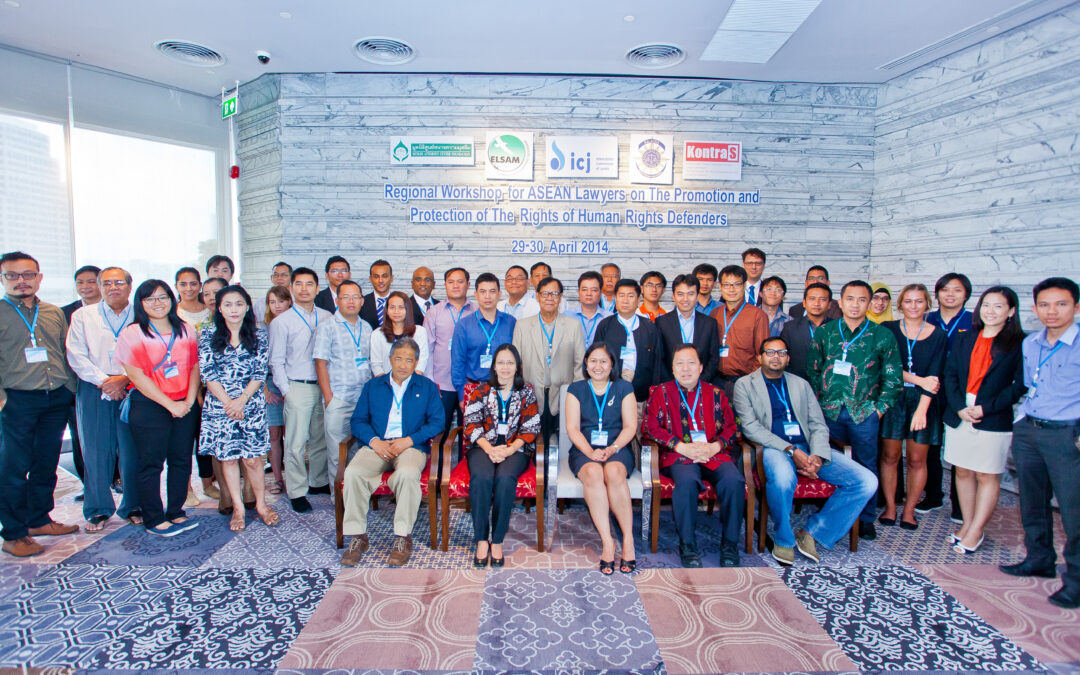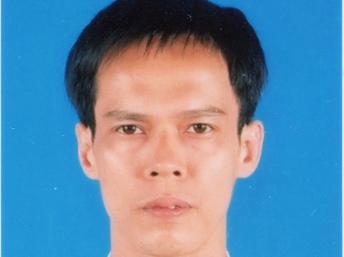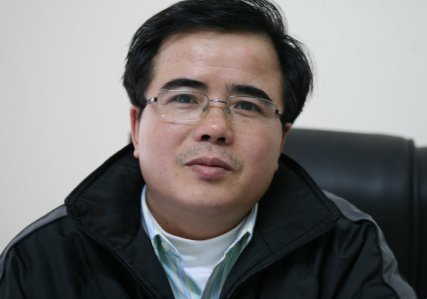
ASEAN lawyers to work towards stronger human rights safeguards
More than 40 delegates from nine countries attended a regional workshop for ASEAN lawyers in Bangkok April 28-30 on the promotion and protection of the rights of human rights defenders.

Viet Nam – lift retaliatory travel restrictions on human rights defender
The ICJ today called on the government of Viet Nam to immediately return human rights defender Pham Chi Dung’s passport so he can travel to the United States to testify before Congress later this month.

Viet Nam: ICJ condemns Le Quoc Quan decision, calls for release
The ICJ condemned the decision by the Court of Appeal of the Supreme People’s Court in Hanoi to uphold the conviction and sentencing of lawyer and human rights defender Le Quoc Quan to 30 months imprisonment.
The ICJ called on Viet Nam authorities to release him immediately.
“The decision of the Court of Appeal is regrettable but not unexpected,” said Sam Zarifi, ICJ’s Regional Director for Asia and the Pacific. “The ICJ has repeatedly criticized the lack of independence of the courts in Viet Nam. This is a political case and the government of Viet Nam has again used the courts to punish a significant critical voice.”
Today’s appellate hearing lasted for four hours. Thirty minutes after the hearing ended, the court released its decision upholding Le Quoc Quan’s conviction.
Le Quoc Quan, a lawyer who was illegitimately barred from practice for challenging government human rights violations, was convicted on 2 October 2013 of tax evasion under section 161 of the Vietnamese Penal Code. The ICJ had criticized Le Quoc Quan’s conviction, pointing out that he did not receive a fair trial.
The Court of Appeal upheld Le Quoc Quon’s sentence with time served since his arrest on 27 December 2012 to be taken into account.
The Court of Appeal also upheld the earlier order made by the People’s Court of Hanoi for Le Quoc Quan’s company to pay 645 million VND (approximately USD30,000) and a fine of 1.3 billion VND (approximately USD60,000), for alleged unpaid taxes.
Le Quoc Quan has been on a hunger strike protesting his conviction since 1 February 2014. He was so weak that it was difficult for him to stand up during the hearing.
“Le Quoc Quan’s faulty trial violated right to an independent, impartial tribunal, and the appeal process also fell short of international fair trial standards, including under the International Covenant on Political and Civil Rights, to which Vietnam is a party,” Zarifi said.
The public was barred from entering the courtroom during today’s hearing and only Le Quoc Quan’s wife, mother, and lawyers were allowed inside.
Le Quoc Quan was also not allowed to meet with his lawyers in the last few days leading up to the appeal hearing.
His lawyers tried to visit him in prison at least twice last week, but they were barred from seeing him.
Le Quoc Quan’s lawyers also confirmed to ICJ that Le Quoc Quan was not allowed to meet and communicate with his lawyers immediately after his conviction by the People’s Court of Hanoi and had to file an appeal on his own.
In drafting his appeal, all legal documents and files pertaining to his case were withheld from him.
The UN Human Rights Committee has emphasized that all convicted persons like Le Quoc Quan must be given copies of a duly reasoned, written judgment of the trial court, as well as other documents such as transcripts, so that they may be able to effectively enjoy their right to appeal.
Under Viet Nam’s laws, lawyers of convicted persons cannot file an appeal on behalf of their clients.
It is only after the appeal has been filed and accepted by the appellate court that the convicted person may identify the lawyer of his choice.
The chosen lawyers are recognized and allowed to participate in the case only after the court approves their application for a “defence counsel’s certificate” or “advocacy certificate”.
The UN Basic Principles on the Role of Lawyers provide that no court shall refuse to recognize the right of a lawyer to appear before it on behalf of his client, unless the lawyer has been disqualified in accordance with domestic law.
“Viet Nam’s courts operate in violation of international standards that clarify that lawyers must be allowed to assist their clients in filing an appeal,” Zarifi said.
Le Quoc Quan cannot appeal the decision of the Court of Appeal under the article 248(3) of the Criminal Procedure Code of Vietnam, which states that decisions of the Court of Appeal are final and legally binding from the date of their pronouncement.
The lawyers of Le Quoc Quan, however, are said to be considering filing a petition on procedural issues on this case.
On 14 February, the ICJ submitted a written statement to the Human Rights Council (see below) under the title “Violations of the right to counsel of Viet Nam human rights defender Le Quoc Quan”.
In the statement, the ICJ called on the UN Special Rapporteur on the Independance of Judges and Lawyers to reiterate her request to the Government of Viet Nam to extend an invitation to her mandate to undertake a mission to the country.
The ICJ also called on Viet Nam to amend its laws expressly to ensure that anyone deprived of liberty, including human rights defenders, are given access to counsel from the moment of deprivation of liberty or at latest within 24 hours of detention.
Viet Nam should also consider including in its laws penalties for law enforcement authorities who do not honour such provisions.
Contact:
Emerlynne Gil, ICJ International Legal Adviser for Southeast Asia, t +66 2 619 8477; email: emerlynne.gil(a)icj.org
Craig Knowles, ICJ Media Consultant, t +66 81 9077653; email: craig.knowles(a)icj.org
Viet Nam-Human Rights Council-ICJWrittenStatement-advocacy-2014 (full text in pdf)

Viet Nam – 30 sentenced to death as country defies calls to amend laws
The ICJ today condemned the imposition of the death penalty on 30 people found guilty of drug trafficking in Viet Nam and urged its government to amend laws and take steps towards abolishing the death penalty.
On 20 January, 21 men and nine women were convicted of drug trafficking following a 17-day trial held within the compound of a detention center rather than in a court.
“Viet Nam has the highest number of executions in the ASEAN,” said Sam Zarifi, ICJ Regional Director for Asia and the Pacific. “This is really of serious concern, especially since its courts have been widely criticized as lacking independence, and judicial proceedings have frequently violated international fair trial standards.”
The ICJ repeatedly has criticized Viet Nam’s violations of Article 14 of the International Covenant on Civil and Political Rights, which guarantees the right to a fair and public hearing by a competent, independent, and impartial tribunal established by law.
Under international law, the death penalty may only be lawfully pronounced as a sentence for the most serious crimes, after a full and fair trial. The imposition of the death penalty in this case — a prosecution for drug trafficking — is inconsistent with international law and standards that define the most serious crimes as those involving the intention to kill and resulting in the loss of life.
“Viet Nam’s failure to abolish the death penalty goes against the global trend,” said Zarifi. “The country has chosen to act contrary to repeated calls in several resolutions adopted by the United Nations General Assembly on the issue.”
According to a report by the Secretary General to the General Assembly in 2012, 150 of the 193 UN member states either have abolished the death penalty or introduced a moratorium on it.
Among member states of the Association of Southeast Asian Nations (ASEAN), the Philippines has ratified the Second Optional Protocol to the International Covenant on Civil and Political Rights (OP2), abolishing the death penalty. Cambodia also has abolished the death penalty. Lao PDR, Myanmar and Brunei have not carried out the death penalty in several years. Aside from Viet Nam, four other ASEAN Member States still retain the death penalty: Malaysia, Singapore, Thailand and Indonesia.
In November 2013, Viet Nam was elected as a member of the UN Human Rights Council.
Sam Zarifi noted, “The recent death sentences handed down in Viet Nam, in violation of international law, suggest a lack of respect for international law at odds with the spirit of a country newly taking its seat at the UN Human Rights Council.”
It is estimated that more than 600 prisoners are now awaiting execution in Viet Nam. It last imposed the death penalty on 19 December 2013 on two former shipping executives found guilty of embezzlement.
The ICJ considers the death penalty a violation of the right to life and the right to be free from cruel, inhuman or degrading treatment.
The ICJ calls on the Government of Viet Nam to immediately establish a moratorium on executions and take steps towards the complete abolition of the death penalty.
CONTACT:
Emerlynne Gil, ICJ International Legal Advisor for Southeast Asia, tel. no. (Bangkok) +66840923575, email: emerlynne.gil(a)icj.org
Craig Knowles, ICJ Media & Communications, (Bangkok), tel.no. +66819077653, email: craig.knowles(a)icj.org




